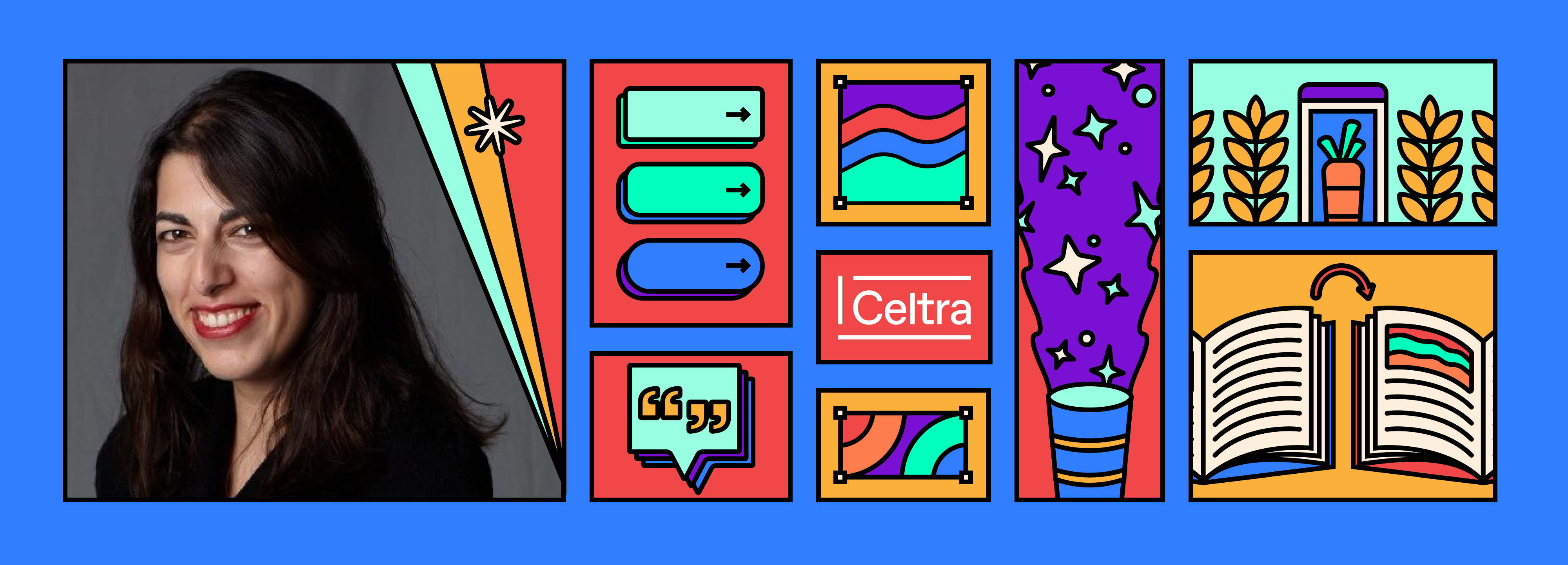
Community Spotlight: Ghazal Badiozamani, Celtra
Ghazal Badiozamani spends her days unlocking creativity through product.
In her role as senior vice president of product management at Celtra, Ghazal oversees the development of technology that helps advertisers focus on what really matters: pushing boundaries in their creative outputs. Machine learning & AI take care of the small details, like resizing assets, to save ad designers time and increase efficiency.
Ghazal spoke about her observations from her years in product management for some of the world’s biggest media & publishing companies. Read our interview to learn why she sees ethics as the top question modern product managers must answer, and how we can use reading to inspire our work in product.
Erica Irish: How did you end up in the product industry? What brought you to your current role at Celtra?
Ghazal Badiozamani: I started out doing corporate strategy at a large global company called Elsevier. We published Galileo’s manuscript back in the 1500s, so there’s a strong, continual focus on evolution and reinventing. I had joined Elsevier to do exactly that: to help them reinvent scientific publishing for the 21st Century.
And as I started to think about what were our potentials for growth, I always kept coming back to product. I would work with different business units to think about how to use this capability for better products…and as I was doing this work, I realized the way we were creating content is actually a big blocker to innovation on the product side.
So my third product that I built at Elsevier is what brought me into a formalized product management role. It was a content offering tool that enabled our authors to write the way they’re used to writing on a white sheet of paper, but on the screen. Then, we would use natural language processing to read the content and tag it to say, for example, this is the definition of a word, or this article is about genetics, so students could find information faster.
I think that’s one of the most interesting things about products today, and for the last 10 years. As we move more and more of our processes from a non-digital world into a digital world, the big question for product managers is how do we move those processes over, and at the same time, take advantage of all the amazing benefits that technology has to offer.
EI: And the landscape isn’t just evolving for product professionals; like you said, it’s also changing for people who maybe don’t have product expertise. People are becoming more accustomed to a world where they’re seeing and interacting with digital products—so how do you balance that expectation shift with the work you’re doing in product management?
GB: Expectations are changing. As something like Amazon takes over the world and everyone becomes accustomed to being able to search for a product, and then instantly purchase it without having any kind of human interaction, that’s a really phenomenal change. Users are starting to expect that kind of behavior everywhere, requiring every other company to modernize and stay relevant in the market.
At the same time, this moment offers huge potential for unlocking value that doesn’t exist or just isn’t possible in the old process, the analog process. Good product managers meet that challenge of modernizing analog processes while, at the same time, understanding technology enough to recognize we can completely re-imagine the process instead of “just making it digital.”
EI: What do you think is a missed opportunity in your field? What’s something that product managers aren’t talking about that needs their attention?
GB: In technology in general, we need to have a conversation around ethics. I often run into young engineers and product managers that are really fascinated by a technology, but they don’t really think about the long-term implications of the tool they’re imagining.
I saw the first product manager for Zynga give a talk recently. He essentially invented Farmville, and he had a lot of regret that he created this game that just sucks people in, without it being a productive use of time or money. So I think for anyone in product, there’s an important question we have to answer around are we actually trying to improve our world in some way, even if it’s in a small, incremental way. We really need to be mindful of the culture we’re contributing to.
EI: That’s a really important point. On maybe a more positive note—where do you go for inspiration? How do you keep your cup full as a product manager?
GB: There’s so much inspiration everywhere you turn—especially over the last five years as product management has really professionalized.
I’ll first give a plug to Teresa Torres. We were actually in the same class in undergrad. If you’re starting out as a product manager, it’s really important to follow people like Teresa and to take classes at Reforge or General Assembly and similar programs.
But as you’re evolving, it’s really, really important to read as broadly as you possibly can. As a product manager, you’re thinking about everything. You’re thinking about behavioral psychology, you’re thinking about correlation and causation, but you’re also, at the end of the day, thinking a lot about human nature itself. The product manager truly has to be a renaissance person—the more you read, the more equipped you’ll be to think broadly when approaching a problem.



